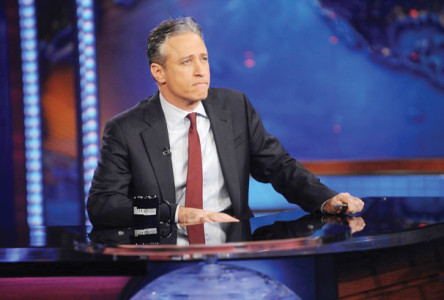
I’ve been a proud fan of “The Daily Show with Jon Stewart” for nearly 10 years now. I credit Jon Stewart with kindling my interest in politics – he helped me navigate my way through the Iraq War troop surge, the indictment of Scooter Libby, the Justice Department scandal involving Alberto Gonzales, and all the rest of the Bush Administration’s greatest hits.
Stewart’s biting look at the news made me more interested in news of all kinds, leading me to follow more “grown-up” news sources in high school and college. This branching out proved especially important in my intellectual socialization; I learned quickly that Dick Cheney, for all of his flaws, was probably not Darth Vader.
I still enjoy watching “The Daily Show” (and, to a greater extent, “The Colbert Report,” though I think his caricature of punditry in general serves a different purpose), and I still try to watch it every night before bed. However, last week one of their segments vexed me. Stewart was talking about the recent $13 billion settlement between JPMorgan Chase & Co. and the federal government over cases from the 2008 mortgage crisis. My roommate, who studies these matters professionally, pointed out the important details Stewart and his writers were omitting from their coverage of this deal. He was worried that the skewed perspective the show was offering might mislead viewers who weren’t well versed in the nuances of the case.
My immediate reaction was, “So what?” Stewart does not claim to be a “real” newscaster. Of course he has an opinion and of course his show is not going to offer the most incisive analysis of a complex issue like this. They’re out to get laughs, and if viewers are foolish enough to not further inform themselves after watching one of these segments, their ignorance is no one’s fault but their own.
However, when I thought about it more, I realized the hypocrisy in my own logic. I don’t consider much of the programming on MSNBC or Fox to be “real” news either, and I’m just as quick to lambast those networks for presenting preconceived prejudices as “objective” interpretation. If people only watch news from sources they agree with, they’re likely to ignore any forms of dissent, which just leads to intransigent and unproductive conversations.
This phenomenon happens all the time with Fox and MSNBC’s viewers, so who’s to say that the same cannot happen with viewers of “The Daily Show?” Sure, I learned pretty early on that I can’t always accept analysis from a show that has a terrorist puppet inspired by Elmo as Gospel truth, but when I consider just how many people my age religiously watch this show and follow no other news publications, I get worried.
So, I’m left with a question I have a hard time answering: what responsibility do “fake” newscasters like Stewart have in their reporting? Whether they like it or not, there is a sizable contingent of viewers who trust the writers on “The Daily Show” more than Sean Hannity or Rachel Maddow (which admittedly is not saying much). Does Stewart get a free pass for acknowledging that what he does isn’t news per se, even though many of his viewers nonetheless interpret it in that fashion? Is playing fast and loose with facts excusable when it’s for the sake of laughs? The ramifications of such an assumption frighten me: a world of “infotainment” where points are trumped by prejudices makes me nervous. I will always have tremendous respect for Stewart and what he does, but I would not mind hearing what others think of this problem.
Bub is a senior majoring in history, English and political science.








